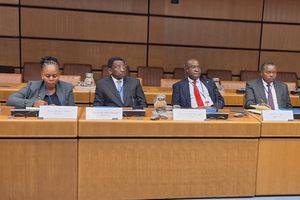
The Kenya Electricity Generating Company (KenGen) head offices in Nairobi.
The Kenya Electricity Generating Company (KenGen) is on the spot for sinking Sh378 million on feasibility studies for projects that have never taken off more than a decade ago.
The National Assembly’s Public Investments Committee on Commercial Affairs and Energy put KenGen managing director Peter Njenga to task to explain why the feasibility studies for some projects that were carried out from as far back as 2012 were undertaken without the necessary approval from the Ministry of Energy.
The committee, chaired by Pokot South MP David Pkosing, raised the red flag over the failure by KenGen to implement projects whose feasibility cost the State-backed electricity generator a total of Sh377,999,568.
The eight projects, whose feasibility studies were conducted between five to 12 years ago, include the 90MW Karura Hydro Power Plant at a cost of Sh163,248,143, the 80MW Meru Wind Farm (Sh119.04 million), Assessment on the performance of Ngong 1 Phase 3 Wind Farm (Sh20 million), and the 10 MW Marsabit Wind Project (Sh27.9 million).
Others are the 45.5MW 7 Forks Solar PV Plant (Sh39.7 million), Prefeasibility Study on the optimisation of existing Hydropower Plants and Development of Pumped Storage Hydro in Kenya (Sh4.45 million), Raising of Masinga Dam by 1.5 meters (Sh3.4 million) and Feasibility Study for Rehabilitation of existing Power Plants, whose cost was not disclosed.
The committee has now opened a full inquiry into how KenGen commissioned the feasibility studies without clear plans, land acquisition, risk assessments and the necessary clearance from the Ministry of Energy and Petroleum. The committee is seeking to know why several consultants were hired before key requirements were met, including identifying project sites or securing land, thereby undermining the credibility and utility of the studies.
“I direct that you go back and furnish us with documents showing who did the feasibility studies for Ngong Wind Power, provide the contract, and tell us how many turbines are to be commissioned and the cost of each turbine as directed by the Kenya Civil Aviation Authority (KCAA),” Mr Pkosing ruled.
“I also direct that you provide us with the contracts and advertisement for the feasibility studies for Karura Hydro Power Plant and the Meru Wind Phase 1 feasibility study for us to open a full inquiry.”
The committee questioned the amount of money already spent on the projects under the eight feasibility studies from the work in progress balance of Sh57 billion.
Mr Pkosing particular wants to know how much has been sunk on the Ngong 1 Phase 3 given that the KCAA had in October 2023 written to KenGen demanding relocation and or decommissioning of existing turbines and stoppage of further development on the proposed 10MW site due to frequency interference with navigation equipment located near the site.
“Are we looking at a white elephant? Who is going to pay for these mistakes if the entire existing 25MW Ngong Wind project is halted?” Mr Pkosing asked. “To protect our air safety, we want clear details. I direct that you appear with the KCAA management when we recall you again.”
The committee also demanded full disclosure, including the names of consultants paid, the terms of reference for each study, and whether those projects have yielded any return on investment.
Nyeri Town MP Dancun Maina questioned why consultants were hired before key requirements such as identifying project sites or securing land were met.
Mr Maina accused the KenGen management of going ahead with feasibility studies before even identifying where the project would be located.
“How do you spend millions without knowing where the project is going to be located?” Mr Maina asked.
The inquiry follows the findings of Auditor-General Nancy Gathungu, who raised concerns about key flagship projects by KenGen. Feasibility studies for these projects were conducted as far back as 2012, but the projects have yet to be implemented.
The committee wants to identify the individuals who initiated the studies and the strategic plans, as well as the supporting procurement records and details of the companies awarded the consultancy tenders.
Mr Pkosing said the 2014 feasibility study for Karura Hydro Power cost Sh163 million is of a particular concern to the committee. The committee heard that the Ministry of Energy did not approve it, and that KenGen is now seeking a new consultant to update the decade-old findings.
"How do you justify spending more money to update a study that should never have proceeded without the ministry’s green light in the first place? This cycle of feasibility studies has become a money pit,” the Mathira MP said.
Mr Njenga was hard-pressed to defend the feasibility studies, arguing that the country’s energy demand is rising hence the need for new investments. He said the studies were part of long-term strategic planning and were aimed at identifying energy generation potential, particularly from wind and solar sources.
“Yes, these projects are actually in the strategic plan for KenGen,” Mr Njenga said.
He said projects like the proposed Meru Wind Farm were stalled due to land acquisition challenges, despite studies being completed years earlier.
KenGen’s General Manager for Strategy and Projects, Elizabeth Muli, said the feasibility studies helped identify optimal project sites and informed subsequent land acquisition.








